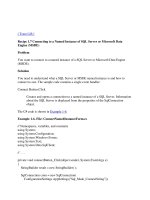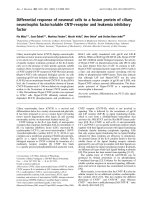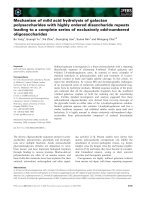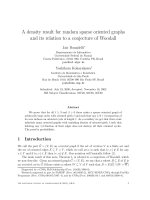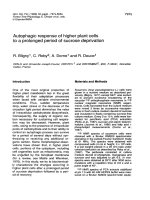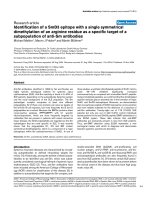2Nd write up its connection to a specific topic of international business
Bạn đang xem bản rút gọn của tài liệu. Xem và tải ngay bản đầy đủ của tài liệu tại đây (78.81 KB, 4 trang )
Each student will write total 3 News Write Ups. News Write Up is a
short (about 500 words) description of a current event (no more than 3 months
old) related to any issues of global business issues. It should contain the
following:
1) Very brief description of the event or the news (about 150 words)
2) Its connection to a specific topic of International Business (about
150 words)
3) How can we (students) benefit and/or learn from it (about 200
words)
4) Provide the source of the article and/or its Internet link
_________________________________________________________
1.
/>The given link stated that the conflict in Ukraine had stressed global
supply networks even further, forcing efforts to reduce interruptions and boost
resilience. Russia's activities in Ukraine are not only causing a humanitarian
catastrophe but also having far-reaching economic consequences. Ukraine's
economy suffers as supply networks deliver food, clothes, equipment, and
materials to agriculture and industries. Simultaneously, Western sanctions
have a significant influence on the Russian economy. 2,550 major US
corporations have tier-one suppliers from Russia or Ukraine. They are no
longer able to deal with such providers. In reality, sourcing1 from this area
affects more US firms than European ones. Even though Russia and Ukraine
will account for just around 4% of the world GDP in 2021, the
interconnection of global supply systems has allowed this war to spill over a
wide range of industrial supply chains. Numerous small businesses are
closing their doors right now. Because of the high energy cost, they cannot
continue to operate. This adds to the significant supply interruptions caused
by the pre- and post-Covid impacts. Furthermore, not many people
comprehend that 16% of the total crew is Russian or Ukrainian. This implies
that maritime freight providers, who have already suffered dramatically from
the epidemic, will now face a 16% decrease in available labour.
2.
Shipping companies have avoided the Black Sea since the crisis
erupted because Russian military involvement has hampered commercial
ships. As a result, exporters have been forced to adjust their routes, causing
congestion at other European ports. Russian military activities in the Black
Sea and repeated assaults on Ukrainian ports, and mining in the seas around
the ports make commercial transportation unfeasible. Although alternate
routes' capacity is predicted to expand steadily, such export is likely more
difficult and expensive than the maritime route. The Russia-Ukraine conflict
is disrupting already weak global supply lines in the aftermath of the Covid19 epidemic (Chasey, 2022). Many input raw materials and fuels, such as
platinum compounds, aluminium, sunflower oil, crude oil, and steel, are not
being delivered on schedule, placing industries in Europe, Russia, and
Ukraine in danger of closure.
Furthermore, rising tensions drive energy prices to increase, increasing
transportation expenses. The effect of Russia-Ukraine tensions on specific
sectors may vary and depend on the length of the war. However, the
intrinsically weak supply networks will most likely have a significant impact.
After the devastating consequences of the Covid-19 epidemic. Not only that,
but the conflict between Russia and Ukraine causes food prices to rise
frequently owing to supply interruptions. Ukraine and Russia contribute 30%
of global wheat exports, 19% of global maize exports, and 80% of global
sunflower oil exports (Chambers, 2018). Due to interruptions in global supply
systems, global food prices have soared, raising the danger of civil unrest in
poorer nations.
3.
The Ukrainian conflict emphasizes modern supply networks' complex,
global, and interdependent character. Disruptions in only one part of the globe
may hugely influence global industry, as shown by the automobile and
semiconductor chip supply chains (Dawson, 2020). There is no simple
solution that can handle these disturbances. Building a regional supply chain
involves a financial investment, time, and human skill (Kane, 2017). The
links in the supply chain are difficult to untangle, as is Europe's dependence
on Russian gas or the US supply chain for items with tight ties to China.
Perhaps this rivalry will strengthen supply chain links across nations with
comparable value systems in the long run. High oil prices directly influence
families, wealth, and consumer expenditure in the European Union. Food
supply constraints are affecting emerging markets. 30% of wheat comes from
Ukraine and Russia, dramatically influencing European living. As a result of
this phenomenon, national governments and industries should implement
policies that strengthen the resilience of critical supply chains. These
strategies include stress-testing supply chains and investing in infrastructure
and ecosystems that enable the creation and manufacturing of critical
materials and components.
Furthermore, producers must use risk-reduction strategies. These
methods include selecting numerous suppliers for essential components,
expanding safety stock, and placing critical suppliers in a more controlling
position. Russia and Ukraine are essential global commodities producers
(Anna). Supply interruptions from these two nations might disrupt global
supply networks and push global commodity prices. The Russia-Ukraine
confrontation might produce significant instability, lowering the chances for
global economic recovery, which the epidemic has seriously harmed.
4. The article link
/>References
Chasey, J. (2022, March 17). How the war in Ukraine is further disrupting global supply
chains. Harvard Business Review. Retrieved October 29, 2022, from />2022/03/how-the-war-in-ukraine-is-further-disrupting-global-supply-chains
Chambers, G. (2018). Ukraine and the Russian Federation: Share of global exports for
maize and wheat. />Dawson, D. (2020). Virus will have huge socioeconomic impact in China. Emerald Expert
Briefings. />Kane, G. (2017). Building a sustainable supply chain. Building a Sustainable Supply
Chain, 37–48. />
